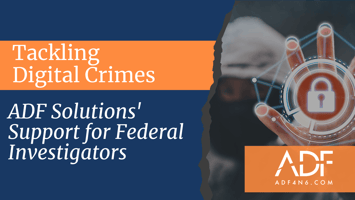Cybercriminal and cyber espionage activity has become more frequent and achievable through...
Unmasking the Faceless Foe: The Battle Against Internet Fraud
Internet fraud, a consistent and evolving threat, poses significant risks to individuals and organizations worldwide. Internet fraud, also known as cyber or online fraud, involves using online services and deceptive practices to defraud victims. The primary motivation for these illicit activities is financial gain, as cybercriminals exploit the trust and vulnerabilities of unsuspecting victims. The 2022 Internet Crime Report produced by the FBI’s Internet Crime Complaint Center (IC3) showed a total of 800,944 reported complaints, with losses exceeding $10.3 billion[1]. The most common crime types were phishing and investment schemes. Phishing schemes were the number one crime type with 300,497 complaints[1]. .png?width=388&height=218&name=Featured%20Image%20(1).png)
Decoding the Faces of Internet Fraud: Recognizing the Threats
Understanding the different types of internet fraud can help users be aware and alert of possible scams. Some types of internet fraud include…
-
Phishing: One of the most prevalent forms of internet fraud, phishing involves using deceptive tactics to trick individuals into sharing sensitive information such as passwords, credit card details, or personal identifiers. Perpetrators pretend to be trustworthy through fake emails, websites, or messages.
-
Business Email Compromise (BEC): scams targeting businesses and individuals performing transfers of funds[1].
-
Online Scams: Online scams come in various guises, enticing victims with promises of financial windfalls, job opportunities, or discounted products. Some examples are lottery scams, romance scams, and fraudulent investment schemes that deceive people for money.
-
Identity Theft: Identity theft occurs when cybercriminals take an individual's personal information to assume their identity. This stolen information is then used to open bank accounts, make unauthorized purchases, or engage in criminal activities under the victim's name.
-
Ransomware Attacks: Ransomware represents a malicious form of software that encrypts a user's files, rendering them inaccessible. Cybercriminals then demand a ransom, often in cryptocurrency, in exchange for the decryption key. Victims are coerced with the threat of permanent data loss if they fail to comply.
-
Data Breach: Suspects will steal and move confidential, protected, or sensitive data from a secure location. Data can be stolen from organizations and individual users.
Understanding the tactics employed by cybercriminals is crucial in combating internet fraud. The following factors contribute to the success of these illicit activities:
The following factors contribute to the success of these illicit activities:
-
Social Engineering: Cybercriminals exploit manipulation techniques to deceive individuals into giving up confidential information. Phishing attacks often leverage social engineering to create a false sense of urgency or trust.
-
Sophisticated Technology: The evolution of technology has equipped cybercriminals with increasingly sophisticated tools and techniques. Malware, keyloggers, and other advanced methods are pivotal in executing internet fraud schemes.
-
Anonymity and Global Reach: The anonymity afforded by the internet allows cybercriminals to operate from anywhere in the world. This global reach makes it challenging for law enforcement agencies to track and apprehend perpetrators.
Law Enforcement's Battle Against Internet Fraud: Digital Forensics Unveiled
As internet fraud continues to evolve, more users will fall victim to these crimes. In response to this growing threat, law enforcement agencies must adapt and equip themselves with the necessary tools and capabilities to conduct their criminal investigations effectively.
Digital forensic tools are designed to facilitate rapid and efficient collection, analysis, and preservation of digital evidence. Digital evidence is crucial in unraveling online fraud schemes, identifying perpetrators, and building strong legal cases. Digital forensic software aids in the preservation of digital evidence in a forensically sound manner.
Maintaining the integrity of evidence is key to ensuring its admissibility in legal proceedings. Digital forensic tools adhere to strict protocols and standards, ensuring the collected evidence remains untainted and defensible in a court of law.
ADF Solutions: Empowering Law Enforcement in the Fight Against Cybercrime
ADF Solutions supports computer forensics and mobile forensics with robust tools tailored to uncover fraud. ADF’s Digital Evidence Investigator PRO streamlines the evidence collection process, allowing law enforcement agencies to respond promptly to internet fraud incidents. This is crucial in preventing further damage, identifying potential vulnerabilities, and staying one step ahead of cybercriminals. Using DEI PRO, investigators can….png?width=391&height=220&name=Internet%20Fraud%20Blog%20Post%20(1).png)
-
Collect evidence on cybercrime and rapidly assess Mac, Windows, Linux, ChromeOS, iOS, Android devices, mobile devices, and external drives.
-
Search and collect emails: MS Outlook, Windows Mail, Windows Live Mail 10, and Apple Mail. This is especially beneficial in business email compromise and phishing attacks.
-
Recover browsers, browsing history, download history, search terms, form data, bookmarks, and more.
ADF Solutions understands the dynamic nature of cyber threats and the importance of staying ahead of emerging trends. We continuously update our tools to address the latest challenges posed by cybercriminals. This commitment to innovation ensures that law enforcement agencies equipped with DEI PRO are well-prepared to tackle the changing landscape of cybercrime. Whether it is Mac forensics, chrome forensics, or mobile forensics ADF tools can capture various digital evidence.
As cyber threats evolve, DEI PRO provides the tools needed to safeguard individuals, organizations, and the digital infrastructure from the pervasive impact of internet fraud.





